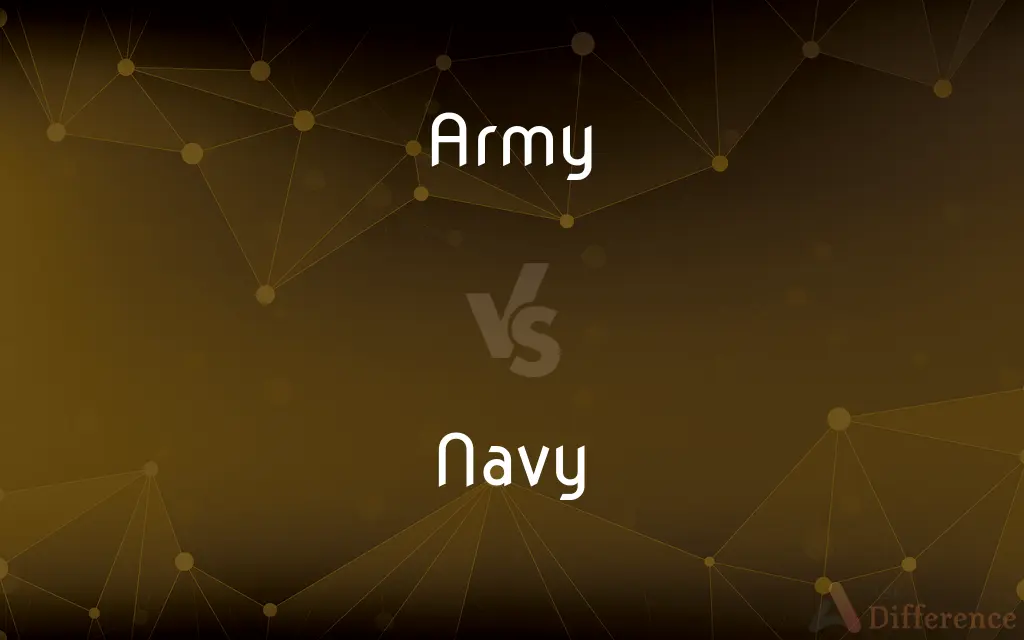Army vs. Navy — What's the Difference?
By Urooj Arif & Fiza Rafique — Updated on April 18, 2024
The Army primarily operates on land, focusing on ground combat and operations, while the Navy specializes in maritime tasks, controlling naval ships, and submarine warfare.

Difference Between Army and Navy
Table of Contents
ADVERTISEMENT
Key Differences
The Army is a branch of the military responsible for land-based military operations. It includes infantry, armor, and artillery units. On the other hand, the Navy primarily focuses on operations at sea, managing fleets of ships and submarines to project power on the ocean and protect national interests.
The Army engages in various forms of ground combat, ranging from direct assaults to long-range artillery support. Whereas the Navy, besides its combat roles, plays a crucial role in securing sea lanes, conducting patrols, and executing strategic strikes from the sea using carrier-based aircraft.
In terms of equipment, the Army utilizes tanks, helicopters, and all-terrain vehicles tailored for land warfare. On the other hand, the Navy operates aircraft carriers, destroyers, and submarines designed for prolonged maritime operations.
The training for Army personnel often emphasizes physical endurance, land navigation, and ground tactics. Conversely, Navy training includes skills pertinent to maritime environments, such as ship navigation, underwater operations, and aircraft handling on carriers.
The Army often works closely with local populations in occupied territories to establish order and support civil authorities. Meanwhile, the Navy’s presence is usually offshore, focusing on blockade, amphibious assaults, and power projection without direct territorial involvement.
ADVERTISEMENT
Comparison Chart
Primary Environment
Land
Sea
Main Units
Infantry, armor, artillery
Ships, submarines, naval aircraft
Operations
Ground combat, occupation
Sea control, power projection, blockades
Equipment
Tanks, helicopters
Aircraft carriers, destroyers, submarines
Training Focus
Land tactics, physical endurance
Ship navigation, maritime operations
Compare with Definitions
Army
A national force for territorial defense and operations.
The Army has a crucial role in national defense strategies.
Navy
A fleet of warships and associated military assets.
The Navy deployed its fleet for a multinational exercise.
Army
A land-based military force.
The Army deployed troops to restore peace in the conflict zone.
Navy
Operates primarily in oceanic and coastal areas.
The Navy's presence deters piracy in the region.
Army
A structured hierarchy of soldiers and officers.
He climbed the ranks of the Army to become a respected officer.
Navy
Specializes in underwater, surface, and aerial maritime operations.
The Navy's submarine silently navigated the enemy waters.
Army
An organized military unit with ground capabilities.
The Army's rapid response surprised the opposing forces.
Navy
A branch of the military specializing in maritime operations.
The Navy's new destroyer is a marvel of modern engineering.
Army
Ground combat specialists within the military.
The Army specializes in direct combat and strategic maneuvers on land.
Navy
Trained in ship operation and naval combat.
Navy personnel undergo rigorous training in maritime warfare.
Army
An army (from Latin arma "arms, weapons" via Old French armée, "armed" [feminine]), ground force or land force is a fighting force that fights primarily on land. In the broadest sense, it is the land-based military branch, service branch or armed service of a nation or state.
Navy
A navy, naval force, or maritime force is the branch of a nation's armed forces principally designated for naval and amphibious warfare; namely, lake-borne, riverine, littoral, or ocean-borne combat operations and related functions. It includes anything conducted by surface ships, amphibious ships, submarines, and seaborne aviation, as well as ancillary support, communications, training, and other fields.
Army
A large body of people organized and trained for land warfare.
Navy
All of a nation's warships.
Army
Often Army The entire military land forces of a country.
Navy
Often Navy A nation's entire military organization for sea warfare and defense, including vessels, personnel, and shore establishments.
Army
A tactical and administrative military unit consisting of a headquarters, two or more corps, and auxiliary forces.
Navy
A group of ships; a fleet.
Army
A large group of people or things, especially when organized for a specific cause or purpose
The construction army that built the Panama Canal.
A banquet with an army of waiters.
Navy
Navy blue.
Army
A large, highly organized military force, concerned mainly with ground (rather than air or naval) operations.
The army was sent in to quell the uprising.
Navy
(countable) A country's entire sea force, including ships and personnel.
People who get seasick easily shouldn't join the navy.
Army
Used absolutely for that entire branch of the armed forces.
The army received a bigger share of this year's budget increase than the navy or air force.
Navy
(countable) A governmental department in charge of a country's sea force.
Army
(often capitalized) Within a vast military, a very large tactical contingent (e.g. a number of divisions).
The Fourth Army suffered such losses that its remainders were merged into the Second Army, also deployed on the Western front.
Navy
A dark blue colour, usually called navy blue.
Army
The governmental agency in charge of a state's army.
The army opposed the legislature's involvement.
Navy
(color) Having the dark blue colour of navy blue.
Army
(figuratively) A large group of people working toward the same purpose.
It took an army of accountants to uncover the fraud.
On sunny days the beaches draw armies of tourists of all kinds.
Navy
(military) Belonging to the navy; typical of the navy.
Army
(figuratively) A large group of social animals working toward the same purpose.
Our house is being attacked by an army of ants.
Navy
A fleet of ships; an assemblage of merchantmen, or so many as sail in company.
Army
(figuratively) Any multitude.
There was an army of construction cranes working on building the skyscraper.
Navy
The whole of the war vessels belonging to a nation or ruler, considered collectively; as, the navy of Italy.
Army
The military as a whole.
The People's Liberation Army Navy of China.
The Yugoslav Army consisted of the Navy, Ground Forces, and Air Force.
Iran's army consists of the Navy, Ground Forces, and Air Force.
Navy
The officers and men attached to the war vessels of a nation; as, he belongs to the navy.
Army
A collection or body of men armed for war, esp. one organized in companies, battalions, regiments, brigades, and divisions, under proper officers.
Navy
Same as navy blue.
Army
A body of persons organized for the advancement of a cause; as, the Blue Ribbon Army.
Navy
Having a color of navy blue.
Army
A great number; a vast multitude; a host.
An army of good words.
Navy
An organization of military naval forces
Army
A permanent organization of the military land forces of a nation or state
Navy
A dark shade of blue
Army
A large number of people united for some specific purpose
Common Curiosities
What kind of equipment is primarily used by the Army?
The Army primarily uses tanks, helicopters, and all-terrain vehicles suited for land warfare.
What role does the Navy play in national defense apart from combat?
Apart from combat, the Navy plays a crucial role in disaster response, humanitarian aid, and securing international waters against piracy.
What are the typical roles of Navy ships in combat?
Navy ships typically engage in patrolling, enforcing blockades, and launching missiles during combat scenarios.
How does the Navy contribute to international diplomacy?
The Navy contributes to international diplomacy by showing a presence in international waters, participating in joint exercises, and aiding in international maritime law enforcement.
How do the recruitment processes differ between the Army and the Navy?
Recruitment for the Army often emphasizes physical and tactical land warfare skills, while Navy recruitment focuses on technical skills and adaptability to maritime environments.
What advanced technologies are unique to the Navy?
The Navy uses advanced technologies like nuclear submarines, advanced radar systems on ships, and naval drones for various operations.
How do the operational strategies of the Army differ from those of the Navy?
Army operational strategies focus on gaining and holding ground, while Navy strategies are about controlling sea lanes and projecting power from the sea.
How do the Army and Navy support civil authorities during emergencies?
The Army supports civil authorities by providing manpower and ground resources during emergencies, while the Navy can offer logistical support from the sea.
How does the environmental impact of the Army compare to that of the Navy?
The Army's environmental impact often involves land degradation due to military exercises, while the Navy's impact includes issues related to marine ecosystems.
How do the Army and Navy cooperate in joint operations?
In joint operations, the Army and Navy coordinate to combine land and sea capabilities, enhancing the effectiveness of military strategies.
What are the differences in living conditions for Army and Navy personnel?
Army personnel typically live in barracks on land bases, while Navy personnel might spend months aboard ships or submarines with distinct challenges like limited space.
What is unique about the career progression in the Navy compared to the Army?
Career progression in the Navy often involves specialized training in technical fields related to maritime operations, whereas in the Army, it might focus more on leadership and combat tactics.
What is the historical significance of the Army in shaping national borders?
Historically, the Army has played a key role in shaping national borders through wars and ground campaigns.
What are the respective educational opportunities within the Army and Navy?
Both branches offer educational benefits, but the Navy often provides more specialized technical training due to the complexity of naval equipment and operations.
How does public perception of the Army differ from that of the Navy?
Public perception can vary, but generally, the Army is seen as a symbol of national strength and land defense, while the Navy is often viewed as crucial for maintaining global peace and maritime security.
Share Your Discovery

Previous Comparison
Harpsichord vs. Piano
Next Comparison
Episcopal vs. MethodistAuthor Spotlight
Written by
Urooj ArifUrooj is a skilled content writer at Ask Difference, known for her exceptional ability to simplify complex topics into engaging and informative content. With a passion for research and a flair for clear, concise writing, she consistently delivers articles that resonate with our diverse audience.
Co-written by
Fiza RafiqueFiza Rafique is a skilled content writer at AskDifference.com, where she meticulously refines and enhances written pieces. Drawing from her vast editorial expertise, Fiza ensures clarity, accuracy, and precision in every article. Passionate about language, she continually seeks to elevate the quality of content for readers worldwide.














































